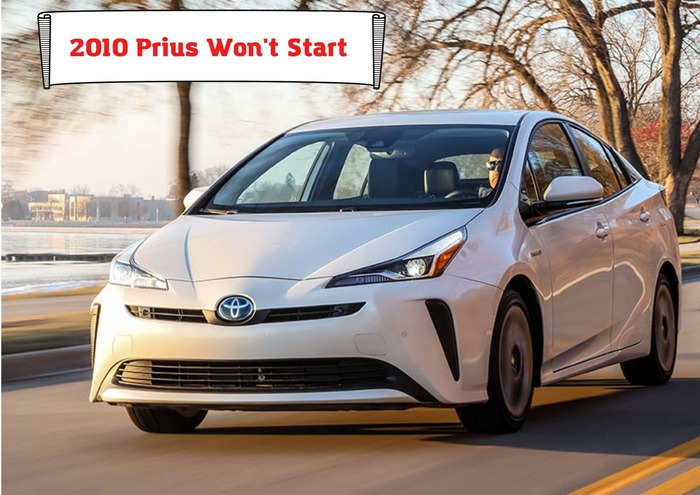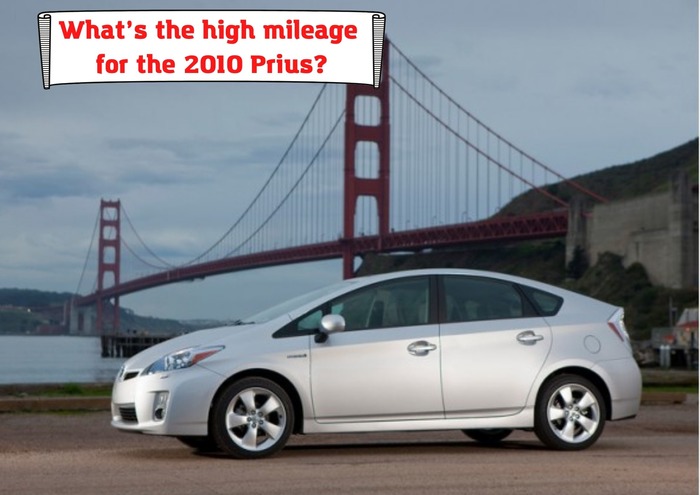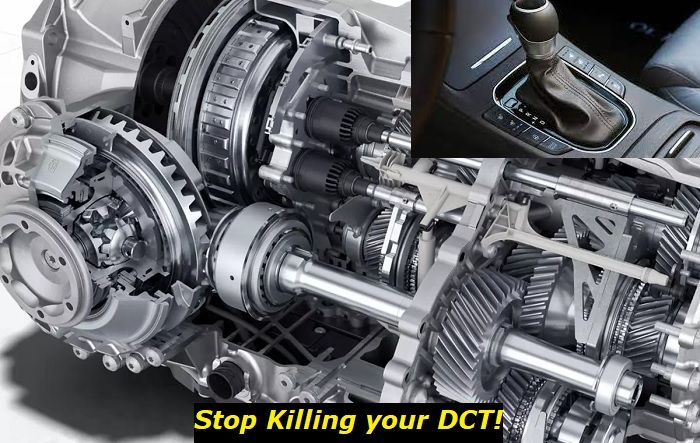
Toyota Prius is one of the most popular hybrid cars. This vehicle opened hybrid technologies to us back in 1997 with the most popular generation of the Prius hatchback being produced from the year 2000. In 2009 the vehicle was widely redesigned. It got a better engine, wonderful performance, and a much better design.
The 2010 Prius is probably the most popular hybrid among all petrol-electric vehicles of that time. The generation is still popular on the market as a used car because it has wonderful longevity and, what’s most important, amazing gas mileage. But it still can show some problems.
Today we’ll speak about the following:
- Why doesn’t your 2010 Toyota Prius want to start?
- Simple tips to make your car still start and go.
- Toyota Prius 3rd generation main problems.
- What is the top possible mileage of the vehicle?
Let’s get started!
Why doesn’t my Prius start?
Usually, Toyota cars are pretty reliable and don’t bother you much with minor issues. Yes, they are expensive to repair, but you won’t spend a lot of time at the service stations trying to figure out what happened with your car.
But once in a beautiful morning you may get into your vehicle and realize that you can’t start the engine. What can be the problem? Your 2010 Prius may not start because of the following problems:
- Dead battery in your key fob. The immobilizer just doesn’t see the key, so you can’t start the engine. This is the most obvious and also the most popular reason.
- Dead car battery. This is much worse. The ICE (internal combustion engine) in your vehicle needs some electric current for the starter to rotate and eventually start. If the battery is dead, you will need to recharge or replace it.
- Wiring problems. The most obvious reason here is a blown fuse. It will be hard to find one without special equipment. The good news is that no expensive repair is needed.
- No gas. Your Prius is not an electric car and it needs some fuel to operate. If there is no gas in the tank, the vehicle will not start and you will not be able to drive it.
- Clogged fuel or air filter. For starting, your engine will need to mix fuel and air and burn it. Because of the clogged filters whether fuel or air cannot get into the combustion chamber. Without one of them, the engine will not start.
- Immobilizer glitching. Immo is the obvious unit to blame in such a situation. It may not “see” the key or it may be just broken and it won’t let you start the car. Glitches of the immobilizer are hard to locate and repair.
- Other problems. There is always the chance that something else happened with your car. Most likely some wires or connections got broken.
As you see, the list of possible problems is not that short. Some things you may check and repair by yourself. But in most cases, you should call your service or a dealer and ask for help. If you have noticed that your car doesn’t start from the first try, you should pay attention to it. Just go to a service station and ask a mechanic to research the problem and find the reason for such strange behavior.
What can you do if your Prius doesn’t start?
There isn’t much you can do. First of all, you should check your key fob. The battery in the key fob may be dead and it may need replacing. This battery powers the immobilizer chip that “communicates” with the immobilizer block in the vehicle. Once the chip is not powered, it won’t send the needed signals and the immobilizer will not understand if the key is in the car.
If this happens, the immo will block the fuel supply, and you will just rotate your engine without a single chance of starting it. What you can do is replace the battery and try again. If it helped, congrats, you won’t need to read more. If it didn’t help, just keep reading.
Then, you may also try to move the connections on the 12V battery under the hood of your car. If your Prius has been standing still in a garage for a long time and now you are trying to start it, the battery may be dead or the connections may have become loose or dirty. Just rub the connections against battery posts and see if it helps.
Other things are hard to do at home where you aren’t likely to have the needed instruments and conditions for repairing your Toyota. So you will most likely want to call a repair shop and have them look at your vehicle.
What’s cool and bad about the 2010 Toyota Prius?
This vehicle rarely has problems like the engine that doesn’t want to start or other troubles. The car is mostly a reliable hybrid vehicle that offers pretty good fuel consumption and is really fun to drive. It’s not the classical hybrid that we are used to now, the technology is known as FHEV or Full Hybrid Electric Vehicle.
This means that the car will not work if the petrol engine doesn’t start or doesn’t operate. Though, you can drive without the electric part of the powertrain. So if the main battery or the electric engine is dead, your Prius will still drive using its 99-horsepower petrol engine.
The car will offer such great options:
- a very reliable Toyota 1.8-liter petrol engine coupled with electric motor;
- the system power is 136 hp which isn’t that bad for a family car;
- the gas mileage in city traffic is around 62 mpg;
- on the highway, the mileage is quite the same;
- the car longevity is not that bad, many old Priuses show huge mileage on their dashes;
- the car is quite comfortable and interesting for families as well as for older people;
- the car is expensive to maintain, but fun to drive and own.
10 years ago, people who had Prius cars were like the ones who buys the latest Tesla models today. They were seen as people who care about nature and think about global warming, fuel use, and all those environmental protection questions. Today Prius is just another hybrid with dozens of other cool projects on the horizon.
But still, this car is a legend, and it’s popular in America even now.
What’s the high mileage for the 2010 Prius?

The longevity of the car is not bad. Toyota Prius 3rd gen owners agree that the car passes the 200 000-mile mark showing no big issues and problems. We saw quite a lot of Priuses with well over 300 000 miles on the clock and their owners told us that they hadn’t yet done any major repair.
But if you actually need to repair your Prius, you better have quite deep pockets. The car is expensive to maintain, and this is the main problem. You will not want your Prius to be broken. So it’s better to sell a car if it is going to reach 300 000-mile mark soon. Once it has, it costs much less.
But some Priuses that were used as taxis or fleet cars have over 500 000 miles on their odometers and they aren’t going to give up. Toyota makes wonderful vehicles, we should say. We are pretty sure that you will still need to repair the transmission and electric drivetrain once or twice within this mileage.
The longevity of your Prius depends much on how you maintain your car, what kind of oil you use for the engine, and how often you change that oil. Also, it will depend much on driving habits. If you want to get a sporty car, Prius is not the best option. It will not last long if you always press the gas pedal to the metal.
So, you should service your hybrid car and just be calm when you are driving. This will help you prolong the life of your Prius and get the maximum out of it.
Final words
Toyota Prius 2010 not starting is a very unpleasant problem that you may face from time to time. Even if your car is a low-mileage vehicle, your key fob can be broken or just discharged. So, in our article, we gave you some tips on what you should check when you have this problem. Also, we outlined some bigger troubles that may have happened to your Prius so that it doesn’t start anymore.
Also, we’ve spoken about the car in general and found out that its top mileage should be around 300 000 miles. If your car is reaching this mileage, you should think about selling your vehicle and buying something fresher instead.
But in general, we love this car and we can recommend anyone buying such a vehicle if you ever find it in a good condition and with low mileage.
About the authors
The CarAraC research team is composed of seasoned auto mechanics and automotive industry professionals, including individuals with advanced degrees and certifications in their field. Our team members boast prestigious credentials, reflecting their extensive knowledge and skills. These qualifications include: IMI: Institute of the Motor Industry, ASE-Certified Master Automobile Technicians; Coventry University, Graduate of MA in Automotive Journalism; Politecnico di Torino, Italy, MS Automotive Engineering; Ss. Cyril and Methodius University in Skopje, Mechanical University in Skopje; TOC Automotive College; DHA Suffa University, Department of Mechanical Engineering






Add comment